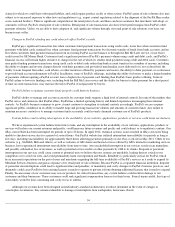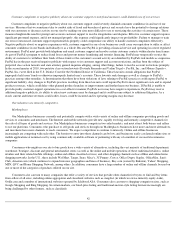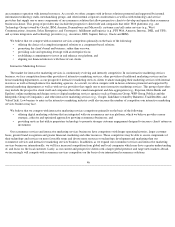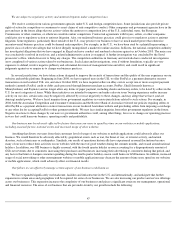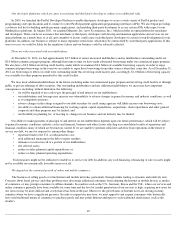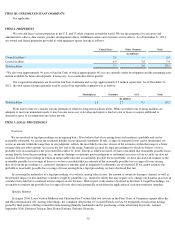eBay 2012 Annual Report Download - page 44
Download and view the complete annual report
Please find page 44 of the 2012 eBay annual report below. You can navigate through the pages in the report by either clicking on the pages listed below, or by using the keyword search tool below to find specific information within the annual report.
Customer complaints or negative publicity about our customer support or anti-fraud measures could diminish use of our services.
Customer complaints or negative publicity about our customer support could severely diminish consumer confidence in and use of our
services. Measures that we sometimes take to combat risks of fraud and breaches of privacy and security have the potential to damage relations
with our customers or decrease activity on our sites by making our sites more difficult to use or restricting the activities of certain users. These
measures heighten the need for prompt and accurate customer support to resolve irregularities and disputes. Effective customer support requires
significant personnel expense, and if not managed properly, this expense could significantly impact our profitability. Failure to manage or train
our own or outsourced customer support representatives properly could compromise our ability to handle customer complaints effectively.
Negative publicity about, or negative experiences with, customer support for any of our businesses could cause our reputation to suffer or affect
consumer confidence in our brands individually or as a whole. Because PayPal is providing a financial service and operating in a more regulated
environment, PayPal must provide both telephone and email customer support and resolve certain customer contacts within shorter time frames.
As part of PayPal's program to reduce fraud losses and prevent money laundering and terrorist financing, PayPal may temporarily restrict the
ability of customers to withdraw their funds if those funds or the customer's account activity are identified by PayPal's risk models as suspicious.
PayPal has in the past received negative publicity with respect to its customer support and account restrictions, and has been the subject of
purported class action lawsuits and state attorney general inquiries alleging, among other things, failure to resolve account restrictions promptly.
In the second quarter of 2010, two putative class-action lawsuits (Devinda Fernando and Vadim Tsigel v. PayPal, Inc.; and Moises Zepeda v.
PayPal, Inc.) were filed in the U.S. District Court for the Northern District of California. These lawsuits contain allegations that PayPal
improperly held users' funds or otherwise improperly limited user's accounts. These lawsuits seek damages as well as changes to PayPal's
practices among other remedies. A determination that there have been violations of laws relating to PayPal's practices could expose PayPal to
significant liability. Any changes to PayPal's practices resulting from these lawsuits could require PayPal to incur significant costs and to expend
product resources, which could delay other planned product launches or improvements and further harm our business. If PayPal is unable to
provide quality customer support operations in a cost-effective manner, PayPal's users may have negative experiences, PayPal may receive
additional negative publicity, its ability to attract new customers may be damaged and it could become subject to additional litigation. As a
result, current and future revenues could suffer, losses could be incurred and its operating margins may decrease.
Our industries are intensely competitive.
Marketplaces
Our Marketplaces businesses currently and potentially compete with a wide variety of online and offline companies providing goods and
services to consumers and merchants. The Internet and mobile networks provide new, rapidly evolving and intensely competitive channels for
the sale of all types of goods and services. Our Marketplaces businesses compete in two-sided markets, and must attract both buyers and sellers
to use our platforms. Consumers who purchase or sell goods and services through our Marketplaces businesses have more and more alternatives,
and merchants have more channels to reach consumers. We expect competition to continue to intensify. Online and offline businesses
increasingly are competing with each other. The barriers to entry into these channels can be low, and businesses easily can launch online sites or
mobile applications at nominal cost by using commercially available software or partnering with any of a number of successful ecommerce
companies.
Consumers who might use our site to buy goods have a wide variety of alternatives, including the vast majority of traditional department,
warehouse, boutique, discount and general merchandise stores (as well as the online and mobile operations of these traditional retailers), online
retailers and their related mobile offerings, online and offline classified services, and other shopping channels such as offline and online home
shopping networks. In the U.S., these include Wal-Mart, Target, Sears, Macy's, JC Penney, Costco, Office Depot, Staples, OfficeMax, Sam's
Club, Amazon.com (which continues to expand into new geographies and lines of business), Buy.com (owned by Rakuten), Yahoo! Shopping,
MSN, QVC and Home Shopping Network, among others. In addition, consumers have a large number of online and offline channels focused on
one or more of the categories of products offered on our site.
Consumers also can turn to many companies that offer a variety of services that provide other channels for buyers to find and buy items
from sellers of all sizes, including online aggregation and classifieds websites such as craigslist (in which we own a minority equity stake),
Oodle.com and a number of international websites operated by Schibsted ASA. Consumers also can turn to shopping-comparison sites, such as
Google Shopping and Bing Shopping. In certain markets, our fixed-price listing and traditional auction-style listing formats increasingly are
being challenged by other formats, such as classifieds.
42




